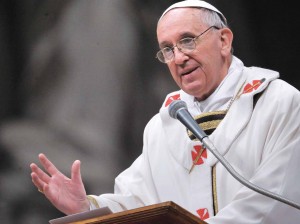Front Row With Francis: The Domestic Church
 At his last Wednesday General Audience of this year, Pope Francis pondered the remarkable fact that Jesus chose to spend the vast majority of His time on earth leading a mundane existence in a backwoods of the vast Roman Empire: “Did this God, who came to save us, waste thirty years there, in that ill-famed periphery?,” Francis wandered.
At his last Wednesday General Audience of this year, Pope Francis pondered the remarkable fact that Jesus chose to spend the vast majority of His time on earth leading a mundane existence in a backwoods of the vast Roman Empire: “Did this God, who came to save us, waste thirty years there, in that ill-famed periphery?,” Francis wandered.
Indeed, “He willed this,” Francis concluded, pointing out that it was neither a mistake of history nor a divine coincidence, because Jesus wanted to spend this time with His earthly family.
On the one hand, this willingness to submit to Mary and Joseph, and to share the lot of the humble inhabitants of the Galilean countryside, speaks volumes about the mystery of the Incarnation. As St. Paul tells us, “Christ Jesus, who, though He was in the form of God, did not count equality with God a thing to be grasped, but emptied Himself, taking the form of a servant, being born in the likeness of men.” (Philippians 2:5-8.)
Moreover—and, this was the focus of Pope Francis’ talk—Jesus’ willingness to spend the lion’s share of his precious life embedded in His human family is a powerful commendation of the spiritual importance of the family to our salvation.
Jesus begins his ministry in the family. We are not given all the details. “In their sobriety, the Gospels do not say anything about Jesus’ adolescence and leave this task to our affectionate meditation,” says Francis. Perhaps, this is so we can fill in the blanks in the way we fashion our own lives and the way we execute the spiritual play books for our own families, as the Holy Family of Nazareth might have done.
“Jesus grew in wisdom and age, and in favor with God and man” within His earthly family. (Luke 2:51-52.) Like the Holy Family, our families’ lives play out mostly in obscurity. Yet, this oblivion is where the rubber meets the road in “The Spiritual Combat”—as Lorenzo Scupoli (1530 –1610) termed the struggle for salvation. Everyone must do what is immediately required of them. Christ began with what was immediately required of Him in the family.
“All members of the family, each according to his or her own gift,” St. John Paul II tells us in his “Familiaris Consortio” (1981), “have the grace and responsibility of building, day by day, the communion of persons, making the family ‘a school of deeper humanity:’ this happens where there is care and love for the little ones, the sick, the aged; where there is mutual service every day; when there is a sharing of goods, of joys and of sorrows.” (F.C., 21.)
In this regard, the family represents “The Church in Miniature,” also translated as the “Domestic Church,” in the words of the Dogmatic Constitution of the Church “Lumen Gentium” (1964), which states that, “The family is, so to speak, the domestic church. In it parents should, by their word and example, be the first preachers of the faith to their children; they should encourage them in the vocation which is proper to each of them, fostering with special care vocation to a sacred state.” (L.G., 11.) When it does this, the Christian family mirrors the Holy Family.
Reform of the family and of the Church can only happen at the local level. Such reforms cannot happen from some distant place, nor will they come down from on high. We can all evangelize and propagate the faith and teach the faith in our own families. In the words of Francis, “As Mary and Joseph did, every Christian family can first of all receive Jesus, listen to Him, talk with Him, guard and protect Him, grow with Him, and thus improve the world.” And we might add, improve the Church, by making her a more prayerful, devoted, and exemplary witness to His message.
When Christ is ready to begin His public ministry, He again puts the spotlight on the family, through His first public miracle, the transformation of water to wine at a wedding in Cana, which He attends in the company of His Blessed Mother (John 2:1-12).
The family occupies a remarkably central place in Jesus’ mission. Thus, “every time there is a family” ready to receive Jesus, says Pope Francis, Jesus “is at work and comes to save the world.”

